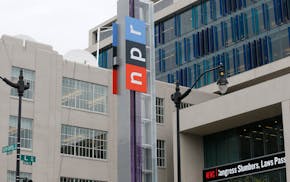For many consumers, the obstacle to buying organic food has always been the price.
"I would buy a lot more organic if it were cheaper," said Eden Prairie resident Brandi Erlendsson. "Now I buy organic fruits and vegetables just for my kids."
But as mainstream grocers and food companies push more aggressively into organics, Erlendsson and other consumers who buy only a select number of organic products may soon get what they want — organic products at or near the price of conventional products.
Wal-Mart and Target are leading the charge to more affordable products. Both announced last month an expansion of more than 100 organic and natural products.
Ninety-one percent of Wal-Mart's shoppers would choose organic over nonorganic products if they were priced closer to conventional, according to the company. Later this year it will introduce the organic Wild Oats line as its exclusive private label at prices comparable to conventional foods. Customers will save 25 percent against comparable organic products, according to Wal-Mart.
Even Whole Foods, which opened four additional locations in the Twin Cities recently, realized that it can no longer lead the market with its high prices and profits. "Competition is more intense right now than we've ever possibly experienced before," said Whole Foods co-CEO John Mackey on a conference call with investors. The company has had to lower prices, although it has done so quietly to avoid any perceived decline in quality.
Supermarkets are enhancing their organic selections because, in addition to being more profitable, shoppers are paying more attention to health in their food and household choices, said Tom Johnson, principal at PricewaterhouseCoopers in Minneapolis. "It will grow exponentially in the coming years. Organic is now becoming part of retailers' commitment to wellness," he said.
Sales of products labeled natural and organic grew 7.5 percent in 2012, twice the overall growth rate of conventional food and nonfood products, according to the Organic Trade Association. Large food producers and manufacturers have been quick to hop aboard the food truck. Smaller brands such as Silk, Horizon, Cascadian Farm and Knutson have been gobbled up by larger companies such as General Mills, Smucker's and Dean Foods.
A retail field that used to be dominated by smallish co-ops (and Whole Foods) is now being integrated in supermarkets from high-end to low-end.
But even local co-ops are also expanding to secure their place at the table. New locations are in store for Lakewinds, Seward, Mississippi Market and the Wedge.
Experts attribute the buying shift mostly to kids. Having children continues to be a principal trigger for buying organics, said CEO Laurie Demeritt of the Hartman Group market research firm in Bellevue, Wash. "Some consumers begin using organics while they are pregnant, while others enter the category once their child has transitioned to baby food or dairy products," said Demeritt.
They're primarily concerned with perceived negative health effects of growth hormones and antibiotics in meat and dairy and pesticides in fresh produce and grains. Buying organics makes parents feel like they are protecting their children and acting responsibly, she said.
As organics go mainstream and prices drop, some insiders and consumers worry whether large companies are committed to doing organic "right," said Demeritt. Now that food companies have released organic versions of processed foods such as Oreos and mac-n-cheese, organic food is no longer tied as closely to good health in consumers' minds. Organic foods with added sugar, corn syrup and unidentified ingredients dilute the appeal.
Others distrust the purity of organic food as it becomes more widely available. Some worry that big companies are trying to water down the USDA's organic labeling criteria. "Trust is a major issue with organics," said Demerritt.
Cornucopia Institute in Wisconsin, an advocacy group that promotes economic justice for family farms, thinks Wal-Mart's claim that it will have organic prices on parity with standard ones is dubious.
"Wal-Mart tried a similar program in 2006 where they sold organics at 10 percent more than conventional," said Mark Kastel, director at Cornucopia. "They failed miserably."
Kastel found that Wal-Mart was using organic factory farms, including using some sourcing of produce from China. Some of the products labeled "organic" were not organic, he wrote in a 2006 report about Wal-Mart organics titled "Wal-Mart: Market Expansion or Market Delusion?"
He hopes that Wal-Mart will use its logistical prowess to do things right this time and make everyone in the grocery industry more efficient, but he cautions consumers that private-label organic products (sold by Wal-Mart, Target, Trader Joe's, Aldi and others) are not in the spirit of the organic movement.
"People who buy organic want to know the story behind their food — who's producing it and where, or how the animals are treated," he said. "The nature of private labels is anonymous."
Despite its success over the past decade, no one expects organics to overtake conventional soon. Only 1 percent of global agricultural land is certified organic, and it takes three years before land can be declared certified. U.S. organic food sales were $35 billion in 2013 according to the USDA, but it represented less than 5 percent of total at-home food sales.
Organic sales are expected to grow 14 percent annually through 2018, according to a TechSci Research Report, but Kastel thinks it depends on factors beyond price alone. "The economy, a food recall or the next Alar scare can make a big difference," he said.
John Ewoldt • 612-673-7633
Georgia's parliament votes to approve so-called 'Russian law' targeting media in first reading
Jill Biden says an agreement to let federal employee military spouses work from overseas is overdue

An NPR editor who wrote a critical essay on the company has resigned after being suspended
